Enver Hoxha’s Adventure with the Marlboro Smuggling! From involvement to state profit and bloody incidents at sea –
Memorie.al / Starting in 1971, for two decades in a row, the communist Albania of Enver Hoxha and his successor, Ramiz Alia, would become part of a “Made in USA” cigarette smuggling line that supplied Italian criminal organizations. On July 25, 1982, the Naval Military Fleet would face the consequences of a bloody incident. The crew of a torpedo boat belonging to the Sazan Island regiment opened fire on a speedboat that was sailing peacefully within our territorial waters.
As a result, one of the two Italian citizens on board the vessel lost his life. The event would shock the communist state from the outset, as an exchange of fire on the open sea was initially reported; consequently mobilizing not only the naval forces but also the air forces. But, beyond the extreme act of violence and the alarm created, this story would also expose another phenomenon that the state of the time kept secret: From 1971, Albania – the small and isolated communist country in the Balkans – had become part of an international cigarette smuggling line.
The commodity sought by the black market came directly from the factories in the United States of America, traveled by ship towards Belgium or the Netherlands, traversed half the states of Western Europe by truck, to arrive and be stored in Durrës. Furthermore, through the Port of Durrës, in an organized manner, the cigarettes became “food” for the Italian Mafia. Almost every day, fast speedboats loaded cartons of Marlboro and flew towards the Italian shores, often pursued by the vessels and aircraft of the Guardia di Finanza (Italian Financial Police).
Just like everything else that was happening, the story of the construction of this smuggling line itself was unbelievable. Lorenc Nenshati, the first director of Albtrans – the enterprise that carried out the Albanian part of the traffic – writes in his memoirs that the offer for Albania to become part of this line had arrived from Switzerland, around 1970. The person behind the offer claimed that he knew Albania and the Albanians, that he was a Jew saved during the Second World War thanks to the generosity of a family from Tirana, and that he saw this offer as an act of reward.
This is the legend, but the reality may have been completely different. Everything might have been related to a business plan. This is because, if you look at the map, the shortest segment connecting the shores of the Italian peninsula with that of the Balkans is in Albania. Thus, only by launching from the Albanian shores could the fast speedboats deliver the cigarette cartons to their destination without much expense, and especially, without an increased risk of capture by the Italian authorities.
But how much was the Albanian state’s profit as part of this smuggling line? According to a statement of operations carried out during January 1982, it is confirmed that the amount earned by “Albtrans” was 134,389 US dollars, which, multiplied by 12 months, settled at an annual profit of about 1.6 million US dollars.
But, while the communist caste in Tirana was content with scraps, on the other side, across the Adriatic, the smuggling of American cigarettes coming from the Albanian shores, with its colossal profit of tens of millions of dollars, would provoke the birth of a new Mafia organization – the SACRA CORONA UNITA. This was especially due to the strong crackdown that the Italian state undertook in 1978 against the phenomenon of cigarette smuggling in the Naples area.
And it was not just the problem of avoided taxes or duties. The main concern was the bloodshed on the streets of Naples, due to conflicts between gangs over cigarette smuggling. Precisely during this period, finding himself in trouble from the continuous crackdowns by the Guardia di Finanza, the head of the CAMORRA – the Neapolitan Mafia, Rafaele Cutolo, instructed two of his collaborators to move to Puglia, with the aim of organizing cigarette smuggling in that region.
The relocation to the Puglian coast was also done with the intention that CAMORRA would be more operative closer to Albania, closer to the Port of Durrës. However, the same situation was sensed by the NDRANGHETA, the powerful Calabrian Mafia, which also hurried to form a Mafia-type criminal organization on the Puglian shores, based on local malavita (crime) elements. Founded in 1981, the new derivative of the NDRANGHETA, named SACRA CORONA UNITA, managed in record time to take control of cigarette smuggling, bypassing the influence of the CAMORRA.
Thus, after 1981, the rebuilding of bases nearby, in the areas of Brindisi and Bari, as well as the control of cigarette smuggling by a single hand – the SACRA CORONA UNITA, increased the demand for American cigarette supply. Mëno Dedaj, the last director of Albtrans, states that in the last years before the change of the political system in Albania, the profit from cigarette smuggling started to go up to 2 million dollars per month.
For its part, until this period, our Naval Military Fleet had tried to manage the situation in the Port of Durrës as well as in our territorial waters. But the increase, after 1981, in the number of speedboats supplied with cigarettes in the Port of Durrës, began to cause problems for the Albanian state. Furthermore, the ships and planes of the Guardia di Finanza not only started to intervene severely to strike this traffic line in their waters and international waters, but they also dared to penetrate deep into our territorial waters.
Here is the content of a Naval Military Fleet report belonging to this period: “At 15:45 on June 25, 1985, the Captaincy of the ‘Enver Hoxha’ maritime port informed us that according to the radio signal received from the motorboat ‘Katia Uno’, under the Panamanian flag, which always comes to us for trade issues, it was being pursued by 5 Italian financial police patrol boats. According to the captaincy’s data and the visual-optical observation of PSV-20 in Durrës, the financial police patrol boats opened fire against the motorboat ‘Katia Uno’, while its pursuit was carried out up to the 3-mile zone…! …With the departure of the torpedo boats from the Gulf of Palla, the Italian financial police patrol boats ceased the pursuit, turned back to exit our territorial waters, and at 17:10 they left them!”
Precisely to avoid such incidents, the Albanian authorities decided to move the Italian cigarette smuggling ships, yachts, and speedboats away from the Port of Durrës. The supply would be made from two ships positioned on the open sea, away from witnesses and spies of foreign embassies. Surprisingly, despite the frequent incidents with the Guardia di Finanza speedboats, the behavior of the crews of the Albanian Naval Military Fleet vessels is documented to have been cautious. According to Captain First Rank, Artur Meçollari, this kind of attitude had a logical explanation: “Incidents with the Guardia di Finanza vessels were not escalated, as the Albanian state was not interested in damaging the cigarette smuggling line.”
The most serious, but also the most documented incident, would be that of July 25, 1982, which took the life of the Italian boat driver, Ghilberto Moretti. Present on the military vessel from which fire was opened towards the smugglers’ speedboat, Ylli Meçaj, the former commander of a squadron of torpedo boats of the Sazan Regiment, testifies that the severity of the Naval Military Fleet’s actions in that period had an explanation.
According to him, the State Security (Sigurimi) had information about the possibility of Xhevdet Mustafa’s landing, and the leaders of the Military Navy had also been made aware of this information. The torpedo boat commanded by Commander Ylli Meçaj was masked on the outer side of Karaburun, near the Gulf of Grama, when it spotted the unknown speedboat moving from south to north. According to the testimony of the surviving boat driver, they had been supplied with contraband “Marlboro” on the Greek island of Fanos, as Othonoi is named by Albanians.
Upon seeing the Albanian army vessel, the Italian boat drivers tried to avoid it quickly in a Westerly direction. The vessel was equipped with three American-made “Evenrude” engines, and it seems the boat drivers thought they could evade the torpedo boat, but precisely these maneuvers cost them dearly. According to Commander Ylli Meçaj, the order to shoot at the Italian speedboat with a “Kalashnikov” was intended to damage the propeller. Meanwhile, the driver of the speedboat himself had resembled Xhevdet Mustafa to him.
The data in the first report about the event, written immediately after the incident by the officer commanding the torpedo boat, can be considered the most reliable: “Seeing that the motorboat refused to stop, we were forced to warn it with a burst of automatic fire at the stern of the motorboat, so as not to harm the people. The motorboat still did not stop and attempted at all costs to get away. Such maneuvers were also done at a distance of 2.6 miles from the shore. Seeing that the motorboat did not follow the orders to stop, but attempted at all costs to get away, the ship’s commander, Aleko Kamberi, then shot at the control panel of the motorboat with an automatic rifle. As a result, one of the two crew members who was steering was hit and fell. The other person took control of the motorboat and again attempted to maneuver to leave. When he saw that we pointed our weapons at him to warn him, he was forced to stop the motorboat.”
In his testimony given to the investigator Ylli Gjermeni, the survivor, Piciolo Kozimo, added an interesting detail. According to him, as the Albanian military ship was pursuing them, they showed the cigarette cartons as a means of identification. It seems the two Italians had accurate information that the Albanian Naval Military Fleet not only did not stop the smuggling speedboats but even helped them in their work.
“Since we were speeding away, they shot into the air with a machine gun to scare us, but we continued to leave by opening the hatch to show them the cigarettes. After these actions, they shot at us several times with weapons, I kept telling the captain to stop, but he did not stop. And as they continued to hit us with weapons, I saw that the captain fell while at the wheel.”
A month later, the court in Tirana sentenced Piciolo Kozimo, the surviving Italian, to one year in prison. He was declared guilty of the crime of illegal crossing of state borders. The Tirana Court also decided that the speedboat and its component parts should be transferred in favor of the state. A few days later, the Supreme Court upheld this decision. The American-made “Marlboro” cigarette smuggling line would be closed at the end of 1991.
According to the last Director of ‘Albtrans’, it was closed only because it was considered “smuggling,” i.e., illegal. Several documents have survived in the Albanian archives, dating from August 1992, which testifies to the persistence of the Minister of Finance, Genc Ruli, with the aim of transferring the ‘Albtrans’ bank account to the Ministry of Finance. Ultimately, the Council of Ministers, on September 1, 1992, approved Genc Ruli’s request to close the foreign currency account of ‘Albtrans’ and transfer its balance to the account of the Ministry of Finance.
According to Mëno Dedaj, even though the line was seemingly closed by trumpeting principles, i.e., by arguing that smuggling was illegal, in the dark, the leaders of the Albanian state had rushed to dirty their hands and plunge into illegality. They had calculated, and even issued official orders, to confiscate the entire quantity of cigarettes that was in the ‘Albtrans’ warehouses. This segment of events is also reflected in the memoir book of Lorenc Nënshati, the longest-serving former director of “Albtrans”.
“When this activity was interrupted, there were 45 thousand crates of cigarettes in the ALBTRANS warehouses, worth 25 million dollars. The firms in relationship were immediately forced to sign contracts with four Montenegrin firms, which had managed to obtain licenses directly through their Prime Minister, who was very interested in this business. The firms sent 19 trucks to quickly transit the goods from Durrës to Montenegro. Naimi (the deputy director), as he later recounted, went to the office of the Minister of Finance at that time, Genc Ruli, to unblock the goods, but he refused. Thus, the trucks returned empty, while their expenses were charged to ‘Albtrans’. It was understandable that a dirty game was being played…”!
But there is another story, even more wicked. A few years later, the same Jew residing in Switzerland, who had collaborated with the Albanian state for 20 years in cigarette smuggling, appeared in Tirana with another offer. Accompanied by one of Europe’s best architects and one of its best economists, he aimed to build a resort and casino in the Orikum area, as well as a cable car in Llogara. The investment of several hundred million dollars envisioned the employment of several hundred local residents. But, in the offices of the Prime Minister’s Office of the time, in the offices of some people who swore to build a democratic Albania, in exchange for the signature that would bring to life the first investment of this magnitude in post-communist Albania, the foreign investors were asked to pay a bribe.
In the 20 years of its operation, the profits from cigarette smuggling did not go to solve any hardship of the long-suffering people under communism. Mostly they went to cover foreign trips, either for illness or for tourism, of the heads of the communist caste in Tirana, their family members, or their favorites.
The closure of the line in 1991, at a time when the monthly profit started to reach the figures of 2 million dollars, has been continuously judged as an unforgivable mistake. Albania at this time was on the brink of survival, and the opportunity arose for the first time for the money earned from smuggling to serve the people. During this period, the Albanian state had as a priority the provision of daily bread for the population. So, using the profits from cigarette smuggling at this time to avert the threat of starvation, constituted no sin whatsoever. Faced with this situation, any sound mind would not attach importance to principles. Principles, with an empty stomach, have no value, they are neither eaten, chewed, nor swallowed./ Memorie.al




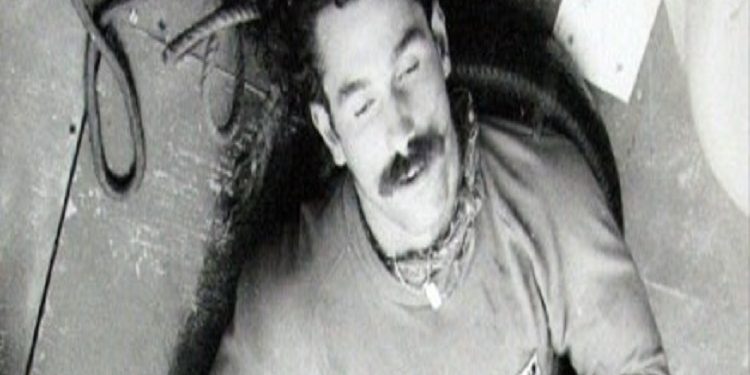
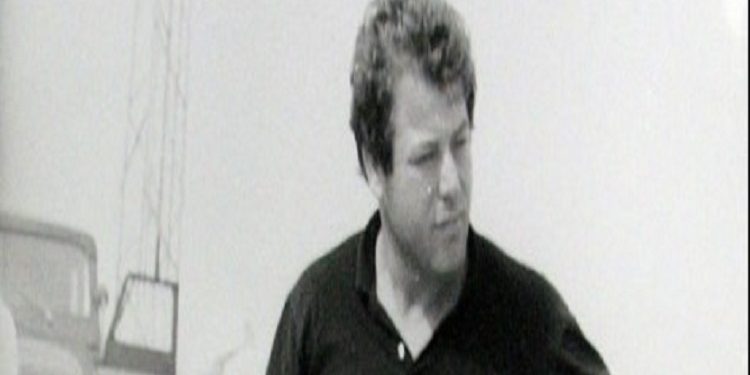
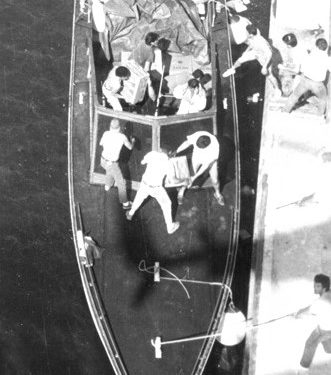
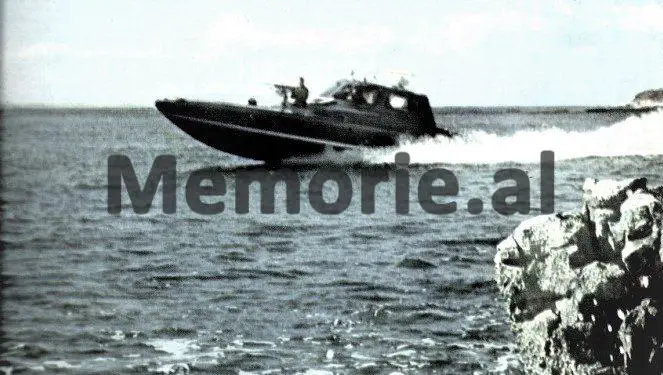
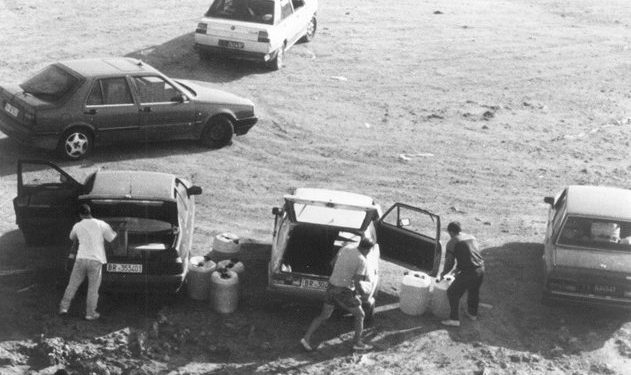
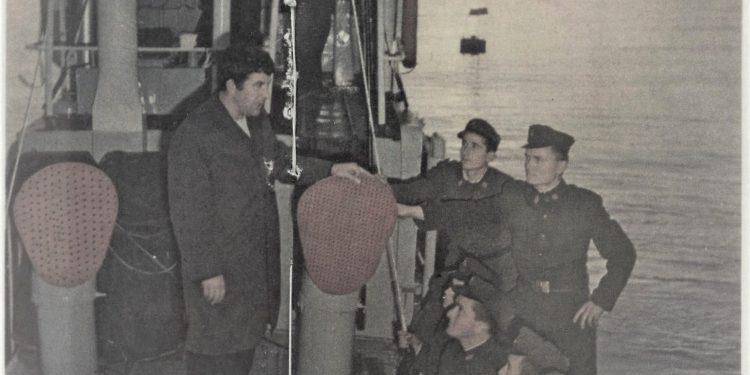
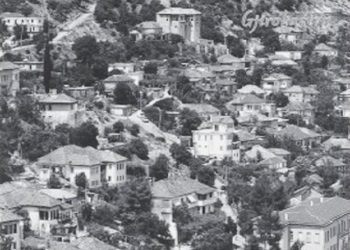
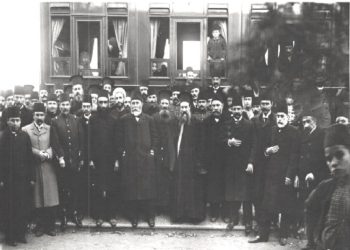
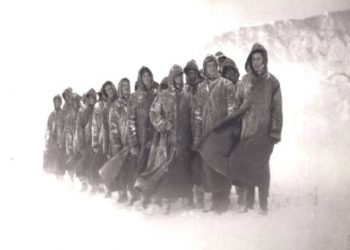

![“When the party secretary told me: ‘Why are you going to the city? Your comrades are harvesting wheat in the [voluntary] action, where the Party and Comrade Enver call them, while you wander about; they are fighting in Vietnam,’ I…”/ Reflections of the writer from Vlora.](https://memorie.al/wp-content/uploads/2025/06/admin-ajax-4-350x250.jpg)

